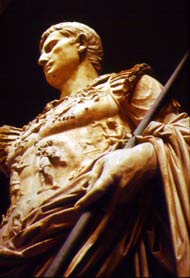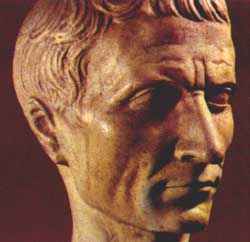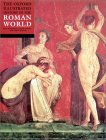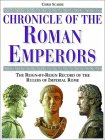Caesar's inheritance
 The conspirators wanted to restore the Republic, but instead, another round of horrors followed. There were troops; there were politicians who aspired to Caesar's autocratic power; and they were prepared to use the troops.
The conspirators wanted to restore the Republic, but instead, another round of horrors followed. There were troops; there were politicians who aspired to Caesar's autocratic power; and they were prepared to use the troops.
Marc Antony, the consul, was now the official head of the state, and his first act was the confiscation of Caesar's papers and treasury. Then, he secured the co-operation of the commander of Caesar's troops outside Rome, Lepidus. Having the men and the money, he could negotiate from strength, and dictated the murderers a compromise: they were to receive amnesty, while Caesar's acts were to be respected, and he would be worshipped as a god. At the end of the day, Marc Antony was in charge of the city.
That very day, Piso opened the testament of his son-in-law. It contained precisely the material that Marc Antony needed: Caesar left his gardens as a park to the city of Rome, and gave every inhabitant a large amount of money. Several days later, Caesar's corpse was burned on the forum. The Roman mob saw the blood-stained cloak, and heard of the money that was to be distributed among them. Then, Marc Antony delivered the funeral oration, in which he inflamed their emotions: shortly after the assault, Caesar's murderers had to escape from the city that they had wished to liberate.
There was one minor cloud on Marc Antony's horizon: Caesar had left three quarters of his estate to his great-nephew Octavius, who was with the army in the east. Most important, Caesar had adopted him as a son, which meant that the eighteen years old Octavius had to change his name and would from now on be called Caius Julius Caesar Octavianus, i.e. Caesar from the Octavius family. The boy decided to return to Italy, and demanded his share, which Antony had already confiscated. At first, nobody seemed to notice the boy, except for Caesar's veterans, but Caesar Octavianus couldn't pay them. However, the soldiers were enthusiast and loved the new Caesar.
By accident, Decimus Brutus was governor of Cisalpine Gaul, and Marc Antony had reason to fear his troops. Therefore, he left Rome to drive away Decimus Brutus. While Marc Antony and Decimus Brutus were fighting at Modena, the Senate convened, and Cicero held several speeches in which he tried to incriminate Marc Antony, pointing out that the consul would return with an army. This, he argued, was the moment to restore the Republic, and Caesar Octavianus might be used ("we must praise him, give him a command and then put him away"). The Senate agreed, and even though Caesar Octavianus was now nineteen, they gave him a military command. He didn't disappoint the Senate: in two battles, he defeated Marc Antony, who fled with difficulty across the Alps, where he managed to gain the support of all troops in Spain in Gaul. Then, Caesar Octavianus showed that actually, he had used Cicero: he marched on Rome and demanded the consulship. Again, the Senate had to yield to a revolutionary leader with an army.
In control of the city, Caesar Octavianus declared Marc Antony's compromise to be illegal and outlawed the murderers of his father. Then, unexpectedly, he decided to sign peace with Marc Antony: he had learned that it was impossible to defeat the man who controlled Spain and Gaul, but together they could destroy the Republic, if they managed to defeat Caesar's murderers, who possessed some troops in the east. In 42, Brutus and Cassius were defeated at Philippi, on the northern shore of the Aegean Sea.
Marc Antony, Caesar Octavianus and Lepidus formed the Second Triumvirate and divided the Mediterranean: Marc Antony received the east, Lepidus Africa and the rest was to be Caesar Octavianus's. Unlike the first triumvirate, which was a private contract, this was an official magistracy, and the People's Assembly and the Senate ratified a bill giving these three men dictatorial powers. Cicero was against this bill, but a murderer took care of him. Formally, the Republic had ended.
Caesar Octavianus was a brave man; he had appreciated political realities; and he was a skilled diplomat. But his successes would not have been this dazzling if his name had not been Caius Julius Caesar, and if he had not been able to claim to be the son of a god.
More successes were to come: in his propaganda, he was able to present the situation as a choice between liberty and stable government. Lepidus was simply appointed pontifex maximus, and will probably have been glad that he managed to survive. Marc Antony fell in love with Cleopatra, and launched a disastrous expedition against the Parthians. It was easy for Caesar Octavianus to present Marc Antony's acts as sacrificing Roman interests to an oriental mistress. In 31, Julis Caesar's heir defeated Marc Antony in a naval engagement off the Greek coast, the Battle of Actium.
Now, it was Caesar Octavianus's turn to make monarchy acceptable, and he found the way that Julius Caesar had merely guessed: in 27, he laid down his triumviral powers, saying that he was content with the honour of restoring the Republic. He would be content with the name Augustus ("the exalted one"). In fact, Caesar Augustus accepted the powers of magistratures (like consulship) without occupying the magistratures themselves. In this way, he managed to control the government behind a republican facade, backed by strong armies.
Caesar Augustus turned out to be the true heir of his divine father: many of Julius Caesar's plans were now implemented. The most important of these was the granting of citizenship to people who did not live in Italy. In the first century BCE the Roman Republic changed into a Mediterranean empire, and Julius Caesar speeded up this process; Caesar Augustus was the executor of this will.
Julius Caesar stimulated the transition of the Roman Republic into a Mediterranean empire, bringing the fruits of empire (relative peace and modest prosperity) to some sixty million people. This conclusion brings us to the final question: was Caesar responsible for this reformation? The conquest of Gaul, the war against Pompey and the autocracy of Caesar are events that move so swift and sure as to appear as if Caesar had a deliberate plan to start a monarchy as an answer to all the world's problems.


|











